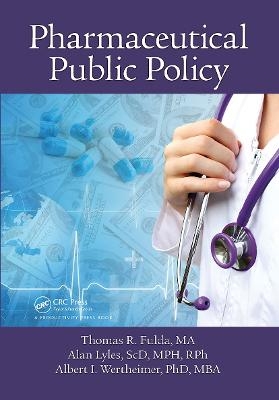
Pharmaceutical Public Policy
CRC Press (Verlag)
978-1-032-24251-4 (ISBN)
As the most common health-care intervention, prescription drug use shares the most important characteristics of the health-care system in the United States. When everything works well, it makes possible breathtakingly successful applications of science to the prevention and cure of human suffering. But everything doesn’t always work well.
Pharmaceutical Public Policy provides the understanding and framework required for effective organization, financing, and delivery of pharmaceutical products and services. It supplies an overview of the policy process as well as the roles of legislation and regulation in pharmaceutical policy.
The book identifies the goals, objectives, and key policy issues of concern to stakeholders involved in the development of products, use of pharmaceuticals in healthcare, and administration of insurance programs by both the private and government sectors. Policy issues examined include the appropriateness of prescribing and patient adherence.
Addressing questions of access, quality, and cost, the book considers the operation of the Affordable Care Act and Medicare Part D. It details the responsibilities of Federal providers of pharmaceutical care and private and public payers such as managed care organizations, pharmacy benefit managers, Medicare, and Medicaid.
The book covers the policies and practices involved in promoting pharmaceutical products. It also considers pharmacoeconomics as a response to market failure. Finally, the book describes the market, the role of the manufacturer, drug shortages, and the responsibilities of the FDA.
The book includes a Foreword by Jerry Avorn, MD, Professor of Medicine, Harvard Medical School; and Chief, Division of Pharmacoepidemiology and Pharmacoeconomics, Brigham and Woman’s Hospital.
Thomas R. Fulda was a federal civil servant for 30 years and held positions at the Social Security Administration and the Health Care Financing Administration. He conducted research on prescription drug pricing, participated in the development and implementation of the Federal Maximum Allowable Cost Program, participated in the planning for the implementation of the prescription drug provisions of the Medicare Catastrophic Coverage Act of 1988, and was responsible for the implementation of the Medicaid Drug Utilization Review provisions of the Omnibus Budget Reconciliation Act of 1990. He also worked at the U.S. Pharmacopeial Convention (Director of Drug Utilization Review), where he managed an expert scientific panel developing drug utilization review criteria. Fulda earned a Health Care Financing Administration Administrator’s Citation, received a Secretary’s Award for Exceptional Achievement for his work, and, in 1995, was named an honorary pharmacist by the American Pharmaceutical Association. Alan Lyles is the Henry A. Rosenberg Professor of government, business, and nonprofit partnerships at the University of Baltimore’s College of Public Affairs, Baltimore, Maryland, and a fellow in the National Academy of Public Administration, Washington, DC. His professional interests focus on access to pharmaceuticals (policy, benefits, and evidence) and the role(s) of public–private arrangements. Professor Lyles serves on the editorial advisory panel of the International Pharmacy Journal and on the editorial advisory board of the Generics and Biosimilar Initiative Journal’s International. In 2006, he was visiting chair of pharmacoeconomics, and in 2007 and 2011 he was a Fulbright specialist at the University of Helsinki. He was a student of Shifu Ryan Velivlis and is a life member of the United States Kuo Shu Federation. Albert I. Wertheimer has had extensive active involvement in the pharmaceutical field for more than 40 years and has held numerous leadership positions. He is author or coauthor of 35 books and more than 400 journal articles. Dr. Wertheimer has guided more than 100 PhD and MS students. He has had experience in the private sector at a pharmaceutical company and with a pharmaceutical benefit management (PBM) firm, in addition to his experience in the academic world. He is a popular lecturer and consultant, having worked in nearly 75 countries.
Policy Process. Federal Legislative Process. Role of Federal Regulations and How They Are Developed. Access, Quality, and Cost. Why Is Medication Use Less than Appropriate? Medication Adherence and Health Policy. Good Governance and Corruption in the Pharmaceutical System. U.S. Food and Drug Administration. Risk Minimization: A New Regulatory Challenge Directive. Drug Shortages. Drug Reimportation into the United States. Competition between Brand-Name and Generic Drugs. Structure and Dynamics of the Pharmaceutical Industry. Health Policy and Economic Issues in Biotechnology and Personalized Medicine. Pharmaceutical Promotion in the United States. Health Technology Assessment. Pharmacoeconomics as a Response to Market Failure: An International Perspective. Market for Pharmaceuticals. Managed Care Pharmacy and Pharmacy Benefit Management. Drug Insurance Design and Management. Electronic Information Technology: Role in Supporting Drug Use and Policy. Assessing Medicare Part D after 10 Years. Medicaid. Medication Therapy Management Services. The Affordable Care Act: Potential Impacts on Pharmaceutical Markets. Role of Government as Regulator, Payer, and Provider of Care. Department of Veterans Affairs Pharmacy Programs. Public Health Service. Index.
| Erscheinungsdatum | 14.12.2021 |
|---|---|
| Zusatzinfo | 26 Illustrations, black and white |
| Verlagsort | London |
| Sprache | englisch |
| Maße | 178 x 254 mm |
| Gewicht | 884 g |
| Themenwelt | Medizin / Pharmazie ► Allgemeines / Lexika |
| Medizin / Pharmazie ► Gesundheitswesen | |
| Naturwissenschaften ► Biologie | |
| Sozialwissenschaften ► Politik / Verwaltung | |
| Technik | |
| Wirtschaft ► Volkswirtschaftslehre | |
| ISBN-10 | 1-032-24251-5 / 1032242515 |
| ISBN-13 | 978-1-032-24251-4 / 9781032242514 |
| Zustand | Neuware |
| Informationen gemäß Produktsicherheitsverordnung (GPSR) | |
| Haben Sie eine Frage zum Produkt? |
aus dem Bereich


